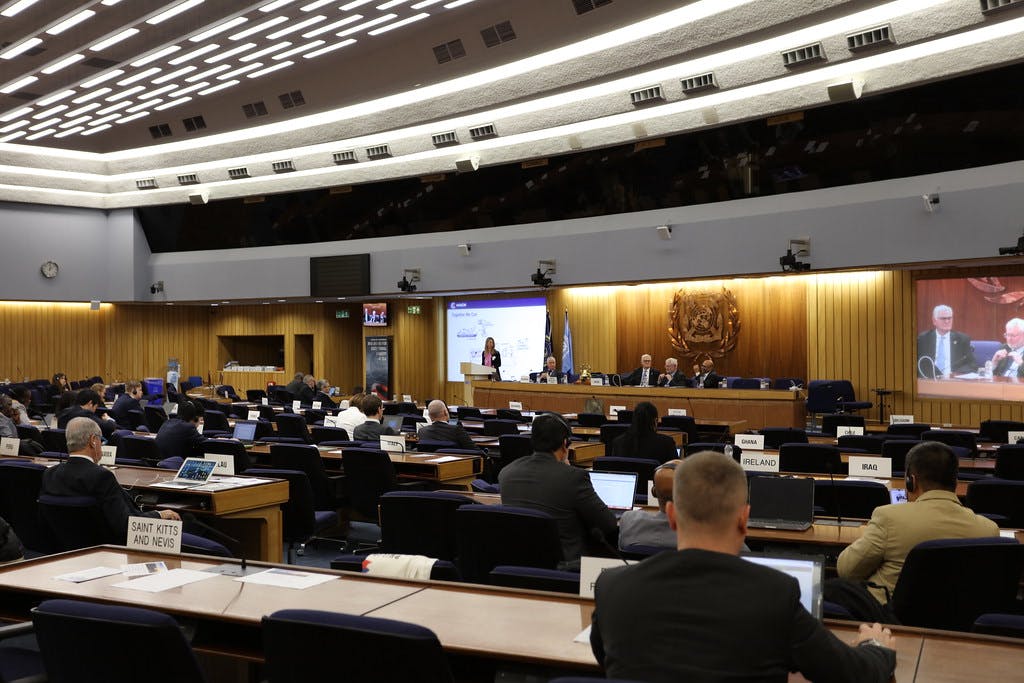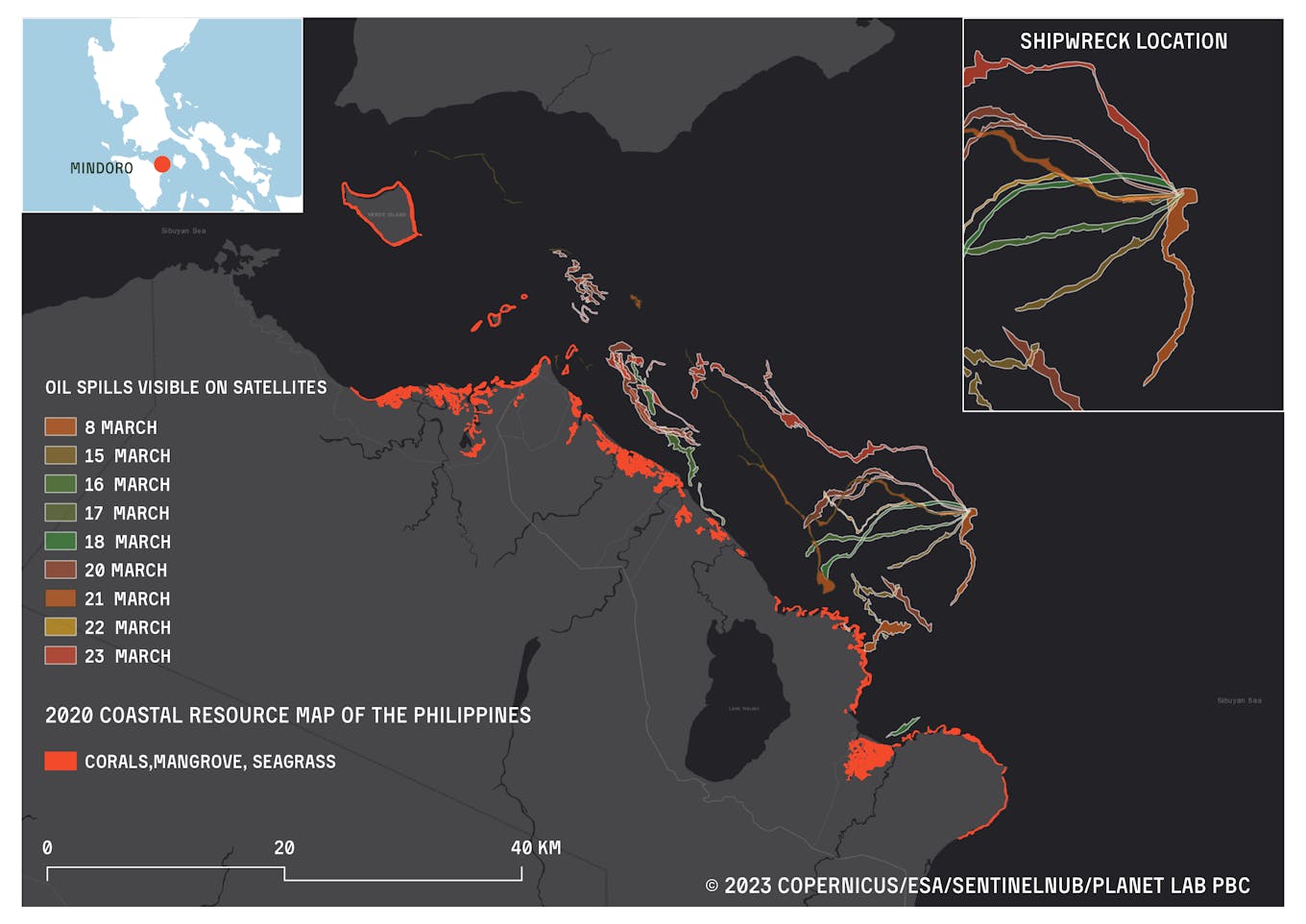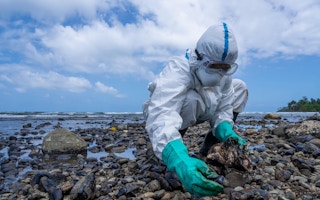It is crucial for the Philippines to support more ambitious climate targets for shipping, in light of the devastating effects of the oil spill that ravaged one of its marine hotspots last month, said observers at the International Maritime Organisation (IMO) in London this week.
To continue reading, subscribe to Eco‑Business.
There's something for everyone. We offer a range of subscription plans.
- Access our stories and receive our Insights Weekly newsletter with the free EB Member plan.
- Unlock unlimited access to our content and archive with EB Circle.
- Publish your content with EB Premium.
The IMO, which is the United Nations body that regulates the safety and environmental performance of international shipping, reconvened on Monday for a week-long debate on the adoption of a net zero shipping emissions reduction target by 2050, stepping up from its current climate plan that only aims to halve shipping emissions within the same time frame. The negotiations are set to continue in June, before targets are finalised at the Marine Environment Protection Committee (MEPC 80) in July.
“The consequences of the MT Princess Empress accident will result in terrible losses to tourism revenue and damage the food security of the region, and this will be felt for many years to come. But the government of the Philippines has the opportunity now to advocate for an ambitious timeline to steer the shipping industry away from dirty fossil fuels towards a clean, renewable, energy future,” said James Gamble, programme director, Arctic at Pacific Environment, a US-based non-profit that aims to protect the living environment of the Pacific Rim.
John Maggs, president of Seas at Risk, Clean Shipping Coalition, the main joint non-profit cooperation group working on shipping issues at the IMO, called the oil spill “another ocean environment tragedy thanks to the notorious shipping and oil industry double act.”
“Ambitious decarbonisation targets for 2030 and 2040 would not just help solve the climate crisis but would also help rid the world of the scourge of tanker’s regularly dumping thousands of tonnes of oil in our fragile and precious ocean environment,” Maggs said.

Delegates at the intersessional working group in the International Maritime Organisation on 16 March. At the last climate summit (MEPC 79) on 12-16 December, 32 countries were in favour of an absolute zero-emission goal by 2050. Image: IMO
The oil spill in Oriental Mindoro, which spans thousands of hectares of marine protected areas in the Visayas island group of the Southeast Asian country, has already reached the Verde Island Passage, a marine biodiversity hotspot encompassing Mindoro Island, Batangas, Marinduque, and Romblon.
Oil tanker MT Princess Empress was carrying 900,000 litres (238,000 gallons) of industrial oil when it went down in rough seas off Oriental Mindoro on 28 February. Since then, the livelihoods of the 18,000 fisherfolk of the province have been affected and almost 200 have been reported sick due mostly to respiratory problems from the smell of the oil. Experts from the United States and Japan have arrived at the province to help the Philippines manage the disaster.
As the conference draws to a close, the Philippine delegation has not made a public declaration for supporting the net zero shipping emission reduction by 2050.
According to a source at the closed-door negotiations, the delegation has instead pushed for seafarers to be trained to manage risks associated with alternative fuels in the run-up to 2050, as the sector seeks to decarbonise. The Philippines is considered as one of the major suppliers of maritime labour globally. It is estimated that there is one Filipino seafarer for every four to five crewmembers on board a vessel at any time.
Hydrogen and ammonia are among the alternative fuels being eyed for low carbon shipping because of their potential for near-zero greenhouse gas emissions. However they are highly flammable and toxic, requiring stricter safety levels than traditional fuels.
The delegation has not immediately given its response to Eco-Business on whether it is ready to join regional neighbours to publicly support a net zero shipping emissions reduction target by 2050.
At the last climate summit (MEPC 79) in December, 32 countries were in favour of an absolute zero-emission goal by 2050, including Asian nations South Korea and Japan, while Singapore and Vietnam declared their support for a net-zero emission reduction by 2050.
Gaps in local laws remain

Satellite imagery shows the day-to-day expansion of the slick that reached coastal ecosystems of Oriental Mindoro, including the biodiversity-rich Verde Island, from the period of 8 to 23 March 2023. Red areas show the location of vulnerable marine ecosystems including mangroves, coral reefs and seagrass beds. Image: Greenpeace Philippines
Even if the IMO succeeds in reducing shipping targets, gaps remain in Philippine shipping laws that may continue to endanger marine environments, said Avril de Torres, environmental and energy lawyer of non-government research institute Centre for Energy, Ecology and Development (CEED).
“It’s well and good that the IMO is finalising shipping reduction targets but there are several Philippine laws focusing on oil pollution with gaps that expose [ecologically-sensitive] areas to aquatic pollution,” she said in a press briefing.
She cited how the Oil Pollution Compensation Act, which was created as a result of the Guimaras oil spill in 2006, contains exemptions for the accountability of ship charterers. Current legislation also allows shipping routes for tankers carrying poisonous substances to pass through marine habitats, like how the MT Princess Empress was permitted to sail through the Verde Island Passage.
Liza Osorio, legal and policy specialist of Oceana Philippines, called on the IMO to look not just at the reduction of greenhouse gas emissions but also regulations on shipping routes which fall under the International Convention for the Prevention of Pollution from Ships (MARPOL), the main international convention aimed at the prevention of pollution from ships caused by operational or accidental causes.
Osorio said: “There are many islands like the Philippines which are archipelagic but are also ecologically-sensitive where ships should not be allowed to pass through especially if they serve the oil and gas industry. We call for a just transition so that we shift away from oil and natural gas and find other energy sources that are more climate-friendly.”
Want more Philippines ESG and sustainability news and views? Subscribe to our Eco-Business Philippines newsletter here.








